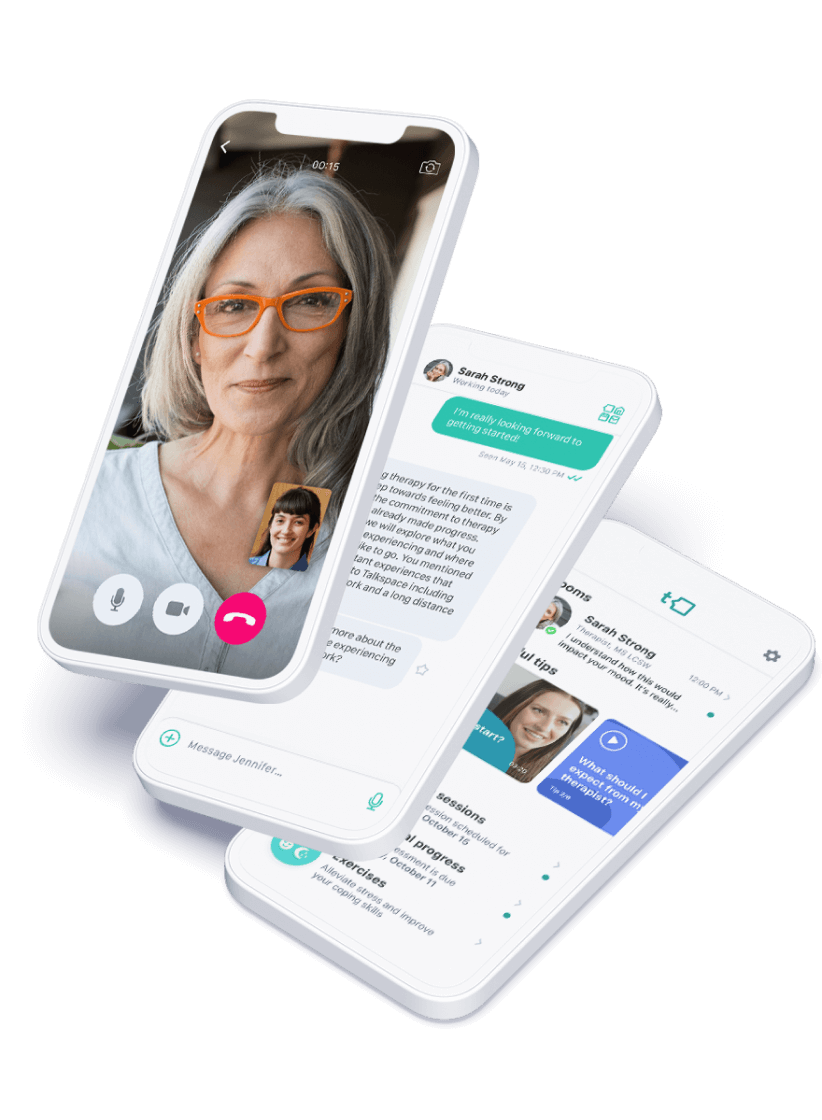Updated On: June 28, 2024
Overview
A whopping 31% of U.S. adults will have an anxiety disorder at some point in their lives. According to research done by Harvard for the National Comorbidity Survey (NCS), anxiety affected an estimated 19.1% of adults in the United States over a year and a half period.
Severe anxiety can be a crippling condition that dominates everything you do. Without proper therapy and anxiety treatment, you may begin feeling overwhelmed and incapable of dealing with your anxiety. The effects of severe anxiety can begin to ripple into every aspect of your daily life.
While we all experience anxiety to some degree at one point or another in life, it’s not normal for it to start taking over your world. If you find this is the case, maybe it’s time to start thinking about anxiety medication and seeing an online psychiatrist.
Keep reading to learn more about the best medications for anxiety, what you need to ask before making any decisions, and more on how to deal with anxiety.
Types of Medications Used to Treat Anxiety
There are some well-known anti-anxiety meds that may be worth looking into if you’re considering medical treatment or if therapy alone isn’t working to reduce your anxiety.
Several types of medication for anxiety have been found effective including:
- Antidepressants
- Benzodiazepines (sometimes called simply “benzos”)
- Buspirone
- Hydroxyzine
- Beta-blockers
Antidepressants
Antidepressants are often the first line of treatment for those with anxiety disorders. There are two subgroups of antidepressant medication that seem to be most effective in treating anxiety.
Selective serotonin reuptake inhibitors (SSRIs)
These are the most commonly prescribed antidepressants for anxiety. They work by helping your brain make more serotonin — a neurotransmitter that aids in regulating and enhancing mood.
Some SSRIs that are commonly used to treat anxiety include:
Possible side effects of SSRIs to treat anxiety:
- Agitation
- Feeling shaky or anxious
- Indigestion
- Diarrhea or constipation
- Blurred vision
- Loss of appetite
- Weight loss
- Dizziness
Serotonin-norepinephrine reuptake inhibitors (SNRIs)
These inhibit reabsorption of certain brain chemicals that can increase or induce anxiety. While SSRIs work only on serotonin, SNRIs can combat low levels of serotonin as well as norepinephrine, both of which impact mood.
Some SNRIs that are commonly used to treat anxiety include:
- Effexor
- Cymbalta
- Pristiq
Possible side effects of SNRIs to treat anxiety:
- Dry mouth
- Nausea
- Headache
- Dizziness
- Excessive sweating
Bupropion
There are a few other antidepressants that can help with anxiety symptoms in addition to SSRIs and SNRIs. They include:
- Aplenzin (bupropion)
- Wellbutrin (bupropion)
- Zyban (bupropion)
Possible side effects of bupropion to treat anxiety:
- Weight loss
- Headache
- Dry mouth
- Nausea
- Insomnia
- Dizziness
- Rapid heart rate
- Constipation
- Sore throat
Tricyclic antidepressants (TCAs)
Tricyclic antidepressants are used in the treatment of anxiety or depression because they work to balance serotonin and norepinephrine — neurotransmitters in your brain. Too much of these chemicals can result in anxiety. TCAs are older drugs that aren’t as common and may have more side effects than some newer drug options do.
- Amitid (amitriptyline)
- Amitril
- Anafranil (clomipramine)
- Aventyl/Pamelor (nortriptyline)
- Elavil/Endep (amitriptyline)
- Tofranil (imipramine)
Possible side effects of tricyclic antidepressants to treat anxiety:
- Slightly blurred vision
- Dry mouth
- Constipation
- Dizziness
- Drowsiness
- Weight gain
- Difficulty urinating
- Excessive sweating (particularly at night)
Monoamine oxidase inhibitors (MAOIs)
MAOIs are yet another type of antidepressant that can be used as an off-label treatment for anxiety. While off-label treatment means the use of a treatment that is approved for a condition other than yours, this is a legal and common way that many conditions are treated. MAOIs are typically prescribed to treat social phobias or panic disorder. MAOIs increase how many transmitters are working to regulate your mood.
Some MAOIs that are used to treat anxiety (again, as an off-label treatment) include:
- Emsam (selegiline)
- Marplan (isocarboxazid)
- Nardil (phenelzine)
- Parnate (tranylcypromine)
Possible side effects of MAOIs to treat anxiety:
- Nausea
- Dry mouth
- Diarrhea or constipation
- Drowsiness
- Headache
- Insomnia
- Dizziness
- Lightheadedness
Buspirone (BuSpar)
Buspirone (BuSpar) is often prescribed in addition to an antidepressant. It can be used when treating general anxiety disorder. While it’s not totally understood why or how buspirone works, it’s thought to affect some of the chemicals in the brain that help regulate mood.
Possible side effects of buspirone to treat anxiety:
- Nausea
- Dizziness
- Headache
- Drowsiness
- Nervousness
- Lightheadedness
- Being tired
- Blurred vision
Hydroxyzine
Hydroxyzine is an antihistamine that’s been approved to treat anxiety. It works by reducing some of the activity in the central nervous system, so it acts as a sedative that can treat tension and anxiety. However, it’s also associated with drowsiness and is used for insomnia, so it may not work for everyone.
There are several brand names for hydroxyzine:
- ANX
- Atarax
- Hyzine
- Rezine
- Vistaril
- Vistaril IM
- Vistaject-50
Possible side effects of hydroxyzine to treat anxiety:
- Drowsiness
- Dizziness
- Fatigue
- Blurred vision
- Urinary retention
- Dry mouth
- Confusion
- Headache
- Irritability
Benzodiazepines
Benzodiazepines are fast acting and known to reduce anxiety by increasing neurotransmitter activity that has a relaxed, sedative effect. They’re commonly prescribed for people who have generalized anxiety disorder, social anxiety disorder, or panic disorder.
The caveat to benzodiazepines is people can easily build up a tolerance to them and they’re addictive. They’re typically not prescribed for a long time period. These are prescribed in conjunction with other medications and rarely used as a sole agent.
Some prescribed benzodiazepines to treat anxiety are:
- Ativan (lorazepam)
- Klonopin (clonazepam)
- Librium (chlordiazepoxide)
- Xanax/Niravam (alprazolam)
- Valium (diazepam)
Possible side effects of benzodiazepines to treat anxiety:
- Confusion
- Drowsiness
- Lightheadedness
- Dizziness or unsteadiness
- Slurred speech
- Memory problems
- Muscle weakness
Beta-blockers
While beta-blockers are a commonly known treatment for heart conditions, they’re also an off-label option for anxiety. Beta-blockers can work for short-term anxiety, like social phobias, stage or speech fright, etc. They’re known to potentially help reduce physical symptoms in certain anxiety disorders — for example, the rapid heart rate or sweating that can be associated with social anxiety disorder.
Since they block the effects of adrenaline (epinephrine) on beta receptors, beta-blockers are considered a beta-adrenoceptor antagonist. Epinephrine is the hormone that plays a significant role in our fight or flight response which is associated with anxiety.
The most commonly prescribed beta-blocker that’s used as an anti-anxiety medication is:
Possible side effects of beta-blockers to treat anxiety:
- Dizziness
- Feeling tired
- Lightheadedness
- Difficulty sleeping
- Nightmares
- Cold fingers/toes
- Feeling sick
Psychiatry and prescriptions online
Get an evaluation and prescription online from a licensed psychiatric provider to improve your well-being.
Medications Commonly Prescribed for Anxiety
The following anxiety medication list shares some (but not all) of the most prescribed medications for anxiety available.
| Name Brand | Generic | Description |
| Lexapro | Escitalopram | SSRI that restores balance of serotonin in the brain to help with anxiety. |
| Zoloft | Sertraline | Another SSRI used to treat a variety of mood disorders. Doesn’t work immediately; can take anywhere from two to six weeks to start reducing anxiety symptoms. |
| Paxil | Paroxetine | SSRI that’s approved to treat general anxiety disorder (GAD) and other anxiety disorders. |
| Cymbalta | Duloxetine | Antidepressant that works to relieve symptoms of anxiety and also treats nerve pain. |
| Wellbutrin | Bupropion | Used to treat anxiety, depression, and to help people quit smoking. |
| BuSpar | Buspirone | Helps people relax, think clearly and worry less to alleviate some symptoms of anxiety. |
| Desyrel, Desyrel Dividose, Oleptro | Trazodone | An antidepressant and sedative that’s known to improve mood, appetite, and energy level while decreasing anxiety. |
| Neurontin | Gabapentin | Also treats nerve pain and seizures. |
| Inderal LA, Hemangeol, InnoPran XL | Propranolol | A beta-blocker that treats a variety of symptoms and conditions. Typically used for short-term relief of social anxiety. |
Talk to your psychiatrist or healthcare professional about the possible risks and benefits associated with the above anxiety medications before starting treatment.
How to Get Anxiety Medication
If you’re thinking about anti-anxiety meds, you should talk to your doctor about getting a prescription. Together, you can come up with the most effective course of treatment to help you manage your anxiety.
Treatment will likely include more than just medication though. Over the counter anxiety medication might also be an option. Talk therapy (psychotherapy) is another effective treatment technique that’s often used, either on its own or in conjunction with anxiety medication.
In order to get anxiety medication, the following steps should be taken:
- Get an anxiety diagnosis
To be diagnosed, you’ll need a psychological evaluation. - Begin therapy or treatment
Therapy can be a key element in managing your anxiety. - Consider your medication options
Review the pros and cons of each type with a professional. - Talk to a prescriber
Your psychiatrist can prescribe your medication for anxiety.
Should You Treat Anxiety with Medication?
Any time you decide to treat a mental health condition with medication — including anxiety — you want to be confident that you understand all your options. Taking the time to discuss your treatment plan with a psychiatrist, doctor, or other healthcare provider is well worth it. You’ll be able to learn more about your options, including what alternatives there are to medication, as well as any potential benefits and drawbacks certain medications might have.
Be sure to have a candid conversation about what medication can mean for you should you decide to take it.
Questions to ask your doctor:
- Should I consider anxiety medication?
Ask your doctor to help you weigh the benefits and drawbacks of any medication for anxiety that you may be considering. - What are the possible side effects of this medication?
Knowing the potential side effects can help you make the best decision. You can be confident in your understanding of which medication you might find the most beneficial. - What other treatments should I be considering for my anxiety?
Medication isn’t your only option for treating intense anxiety. You can choose to combine anti-anxiety meds with other holistic, self-help techniques as well as therapy. - Should I consider treatment in conjunction with anti anxiety medication?
Any time you make the decision to begin medication for a health condition, you want to be sure you understand what else you might need to do. For example, should you consider talk therapy in addition to medication? Your doctor can help you make that decision. - Are there any holistic or self-help techniques I can try?
There are a number of holistic and self-help techniques you can implement to help you manage intense anxiety. Meditation, journal writing, exercise, a healthy diet, and a consistent, regular sleep habit can all be important in controlling anxiety. - Should I consider therapy in addition to medication?
Certain forms of talk therapy — like types of cognitive behavioral therapy (CBT) — are known to be productive and effective in dealing with anxiety. - Are there any other conditions going on that could be contributing to my anxiety?
Anxiety is related to multiple other mental and physical conditions. If not dealt with, it can either lead to or worsen existing conditions like depression, substance abuse, insomnia, digestive problems, and other physical health issues like headaches, bowel problems, or migraines.
If you’re ready to seek anxiety treatment through medication, get connected with a prescriber.
See References
-
National Comorbidity Survey
Hcp.med.harvard.edu. Published 2021. Accessed October 11, 2021.
-
Cognitive-behavioral therapy for generalized anxiety
Borza L. Dialogues Clin Neurosci. 2017;19(2):203-208.
-
Anxiety Disorders and Depression Research & Treatment
Anxiety and Depression Association of America, ADAA. Accessed October 11, 2021.
-
Mental Health Medications
NAMI: National Alliance on Mental Illness. Nami.org. Published 2021. Accessed October 11, 2021.
-
Hydroxyzine
Entringer, PharmD. S. Drugs.com. Published 2020. Accessed October 11, 2021.

Dr. Muhammad Munir, MD, DFAPA, has over 20 years of clinical experience specializing in mood disorders, anxiety disorders, bipolar disorder, PTSD, panic disorder, and ADHD. Dr. Munir believes in “back to basics” the therapeutic alliance between the physician and patients. The hallmark of this alliance is the emphatic process whereby the patient is not only enabled, but educated and encouraged, to take an active role in their psychiatric care and wellbeing.
Articles about Generalized Anxiety Disorder
View all articles
Overcoming Parental Anxiety: Strategies for a Calmer Mind

15 Effective Coping Skills for Anxiety

Acupuncture for Anxiety: Does it Work?

Does Alcohol Cause Anxiety? Exploring the Connection

Agoraphobia vs Social Anxiety Disorder: What’s the Difference?

13 Best Jobs for People with Social Anxiety

Election Anxiety: How to Cope With Political Stress

Social Anxiety vs Autism: How to Tell the Difference

Anxiety & Fatigue: Exploring Why Anxiety Makes You Tired

Anxiety and Anger: Why Anxious Feelings Can Make You Angry


